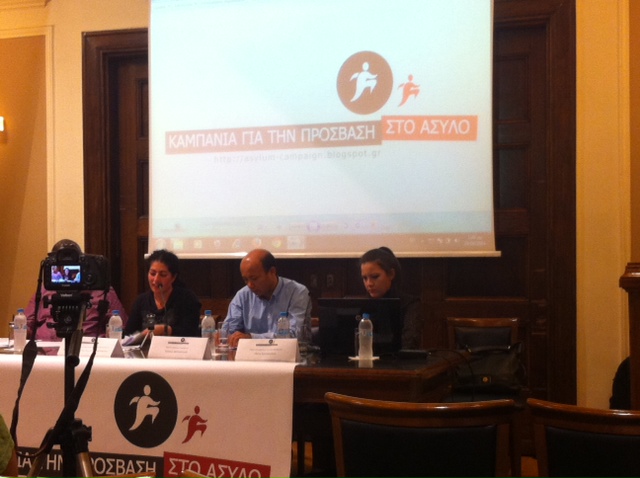Photo: kathimerini.gr/ ENRI CANAJ
Anastasia Balezdrova
A total of 11,733 people from different countries have requested to be granted refugee status in Greece over the past year and a half. The statistical data is from 7 June 2013 when the Asylum Office of the Ministry of Citizen Protection began to function and this 31 September it ceased operations.
This number includes the requests of the illegal immigrants who are in detention centres. According to the statistical data of the service they are 2,499; in 2013 the number of submitted requests was 542, and from the beginning of this year to the end of September 1,957. "267 requests, or 20.1% of the total number, were satisfied and asylum was granted. In another 160 cases, the applicants were granted a subsidiary protection status. 899 requests were rejected," said Office representative Eleni Petraki.
She presented the data at a press conference organised by the Greek non-governmental organisations united in the organisation "Campaign for Access to Asylum".

According to the activists, there are 7,500 people in the centres for immigrants at present, and the requests for asylum filed by 2013 were 43,000. According to them, many of the immigrants do not even know they have the right to submit such a request, whereas others wait for months to be invited to an interview at the Asylum Office.
For her part, the Office representative said that it takes more time to establish the identity of the asylum seeker in some cases. The most common problem faced by her herself and her colleagues is to identify the country of nationality of the applicant. "The average time from the submission of the request to the conducting of the interview is 23 days and from the interview to the decision 40. The waiting time to appeal the decision is almost the same, namely about 41 days from the submission of the complaint to the final decision." Petraki added that the electronic system for the registration of claims will be activated soon, thus making it possible to satisfy the request of asylum seekers when they express it before the police authorities at detention centres or police stations.
They described the living conditions in them as extremely poor. "They have no sanitation and basic necessities, food is neither sufficient nor of adequate quality and some of them sleep on mattresses directly on the floor when the premises are overcrowded. There are cases when the mattresses are insufficient and the hygiene of the premises is miserable," reads the report.
In many places immigrants have complained that their access to toilets is limited because they are outside the room. "In some cases they are allowed to go to the toilets only three times a day and in the remaining time they are therefore forced to urinate in bottles that they showed us during our visit there," said a representative of one of the organisations. The lack of a physician and medicines is another major problem.
Human rights activists stressed that the Greek authorities must take urgent measures to speed up the procedures relating to the granting of asylum, as the long stay of the immigrants in the centres is the cause for very serious health problems among them. According to them, Greece directly violates Article 3 of the European Convention on Human Rights by failing to improve the living conditions in the centres. "The situation is particularly bad in the arrest areas of police stations where asylum seekers are being detained, although the law prohibits it. Usually they are in the basements of the buildings and the result is that the people there do not have access to natural light, nor do they have the opportunity to walk outside." They indicated that in detention centres there are people such as unaccompanied children, people with severe infectious diseases and victims of torture, who simply should not be detained but obtain protection from Greece, in compliance with the signed international agreements.
Finally, they indicated that it is necessary to provide free legal assistance to asylum seekers both in connection with the appeal of the decision on extradition and at all stages of the asylum granting procedure. In response, the Office representative explained that this issue is going to be solved with the assistance of non-governmental organisations.
It is worth noting that in Greece there are nine places where applicants wishing to obtain refugee status can submit their requests, namely Athens, Thessaloniki, Komotini, Lesbos, Rhodes, Amigdaleza, Patras, North and South Evros. Only five of the units are located outside detention centres or police stations, which according to human rights activists deters the applicants from appearing there, for fear of being arrested and extradited.